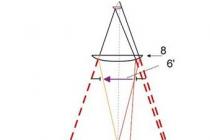The law specifically indicates which violations of labor duties by an employee should be classified as gross:
a) absenteeism (absence from work without good reasons more than 4 consecutive hours during the working day);
b) appearing at work in a state of alcoholic, narcotic or other toxic intoxication;
c) disclosure of legally protected secrets (state, commercial, official and other) that have become known to the worker in connection with the performance of their labor duties;
d) committing at the place of work theft (including small) of another's property, embezzlement, its deliberate destruction or damage, established by a court verdict that has entered into legal force or a decision of an authority authorized to apply administrative penalties;
e) violation by the employee of labor protection requirements, if this violation entailed serious consequences (accident at work, accident, catastrophe) or knowingly created a real threat of such consequences.
This list of gross violations is exhaustive and is not subject to broad interpretation.
Absenteeism
Truancy is one of the most serious violations of labor discipline. Therefore, the legislation secured the right of the employer to terminate the employment contract with the employee, even for a single absenteeism without a good reason. Absence from work during the whole working day or a shift or absence from work (an employee being outside the workplace) without a good reason for more than 4 hours in a row during the working day is recognized as absenteeism. The law of June 30, 2006 No. 90-FZ also supplemented the concept of absenteeism with such a type as absence from the workplace without good reason throughout the working day (shift), regardless of its (her) duration. This addition was made due to the fact that in some cases, by decision of the employer, the working day can be set to less than 4 hours. Thus, now if the employee came to work, but then was absent from the workplace during the entire working day, which was less than 4 hours, his actions should be regarded precisely as absenteeism.
Special cases of absenteeism are also:
- leaving work without good reason by a person who has entered into an employment contract for an indefinite period, without warning the employer about dismissal due to own will;
- leaving work without good reason before the expiration of the two-week notice period for dismissal of one's own free will;
- abandonment without a valid reason of work by a person who has concluded an employment contract for a certain period, before the expiration of the contract or before the expiration of the notice of early termination employment contract;
- unauthorized, without the permission of the administration, the departure of the employee on vacation, at least within the time limits determined by the vacation schedule;
- unauthorized, without the consent of the administration, the use of days off (provided, for example, for work on weekends), except in cases where the employer, by virtue of the law, did not depend on the decision on the time of granting the specified days off or rest and he illegally refused to provide these days (for example, refusal to provide an employee who is a donor in accordance with part 4 of article 186 of the Labor Code and article 9 of the Law of the Russian Federation of June 9, 1993 No. 5142-1 "On donation of blood and its components" a day of rest directly after each day of donating blood and its components);
absenteeism from work after the transfer of the employee to new job produced by the employer in full compliance with applicable law.
However, if the transfer is recognized by the judicial authorities as illegal, then the dismissal of the employee cannot be considered justified and he must be reinstated in his previous job.
Absenteeism is absence from work. If the employee did not appear at events not related to work (although they are held in work time), then this cannot serve as a basis for dismissal (for example, the employee did not go to a demonstration, other social events, the employee did not appear at the solemn meeting of the foreign delegation that visited the company, the employee did not appear at the presentation of a new product of this company, etc.) .
If, when resolving a dispute on the reinstatement of a person dismissed for absenteeism, and collecting the average earnings for the period of forced absenteeism, it turns out that the absence from the workplace was caused by an unexcused reason, but the employer violated the dismissal procedure, the court, when satisfying the stated requirements, must take into account that average earnings in such cases, a reinstated employee may be charged not from the first day of absenteeism, but from the date of issuance of the dismissal order, since only from that time absenteeism is forced.
Compiling a complex form with a specialist will cost a lot. The reason - the absence of errors is sometimes crucial. The assistant begins to have emotions about the person who stated their reasons by reading the document and its contents. In effect, the statement is a substitute for the intellect of the signatory. It becomes fundamentally influential in places if the exit depends on an emotional decision.
In the first part of the article on violation of labor discipline, the primary grounds for dismissal of an employee at the initiative of the employer were given - these are repeated failures by the employee to fulfill their labor duties and gross violation labor discipline, which is expressed by absenteeism. There are also other grounds for terminating an employment contract at the initiative of the employer, which are established by the Labor Code of the Russian Federation.
In addition, at the initiative of the employer, the contract may be terminated with the employee in connection with the disclosure of the latter secrets protected by law - state, official, commercial and other, which became known to him due to the fulfillment of certain labor obligations. At the same time, the admission to secrecy and the obligation to not disclose it must be formalized by the employer in an appropriate way and be reflected in the employment contract concluded with the employee. A disciplinary sanction in the form of dismissal on the basis of disclosure by an employee of a secret can be carried out only after the fact of disclosure has been established in court.
Disclosure of a trade secret, as well as its illegal receipt, also entails liability under the current legislation, including criminal liability. The admission of an employee to information constituting a commercial secret is carried out both with the consent of the employee and in the conditions of the existence of certain labor obligations stipulated by the employment contract. The employer, in order to ensure the protection of confidentiality of information, is obliged:
To familiarize the employee with the list of information constituting a commercial secret, the confidentiality regime and the measures of responsibility for its violation;
Create all conditions for the employee to comply with the established trade secret regime.
Read also:
11.1. Violation of labor discipline, i.e. failure to perform or improper performance through the fault of the employee of the duties assigned to him by the employment contract, the Charter of the Center, these Rules, model provision about the establishment additional education children, job descriptions, a collective agreement, other local acts of the Center, entails the application of measures of disciplinary or public influence, as well as the application of other measures provided for by applicable law.
11.2. For violation of labor discipline, the employer imposes the following penalties:
11.2.1. comment;
11.2.2. rebuke;
11.2.3. dismissal for appropriate reasons.
11.3. Prior to the imposition of a penalty, an explanation in writing must be requested from the violator of labor discipline within two working days. An employee's refusal to give an explanation is not grounds for not imposing a disciplinary sanction. In this case, an act is drawn up on the refusal of the employee to give a written explanation.
11.4. A disciplinary sanction is applied no later than one month from the day the misconduct was discovered, not counting the time the employee was sick.
11.5. A disciplinary sanction may not be applied later than six months from the date of the act, and based on the results of an audit, audit of financial and economic activities or an audit, later than two years from the date of its commission.
11.6. The imposition of a disciplinary sanction is carried out by the administration within the limits of the rights granted to it. Only one disciplinary sanction may be imposed for each violation.
11.7. Disciplinary investigation of violations teacher standards of professional conduct can only be carried out upon a complaint filed against him, filed in writing. A copy of the complaint must be given to this teacher.
11.8. The collection is announced by the order of the Center. The order of the director on the application of a disciplinary sanction must contain an indication of the specific violations of labor discipline for which this sanction is imposed, the motives for applying the sanction. The order is announced to the employee against signature within three days from the date of its publication, not counting the time the employee was absent from work. If the employee refuses to familiarize himself with the specified order against signature, then an appropriate act is drawn up.
11.9. Dismissal as a measure of disciplinary action is applied in the following cases:
11.9.1. repeated non-performance by employees without valid reasons of labor duties (if he has a disciplinary sanction) assigned to him by the job description, the Charter of the Center, the Rules of the internal work schedule(Clause 5, Article 81 of the Labor Code of the Russian Federation);
11.9.2. absenteeism, that is, absence from the workplace without good reason throughout the working day, regardless of its duration, as well as in case of absence from the workplace without good reason for more than four hours in a row during the working day (paragraph 6a of article 81 of the Labor Code of the Russian Federation) ;
11.9.3. the appearance of the employee at work (at his workplace or on the territory of the organization - the employer, where, on behalf of the employer, the employee must perform labor function) in a state of alcoholic, narcotic or other toxic intoxication (paragraph 6b of article 81 of the Labor Code of the Russian Federation);
11.9.4. committing at the place of work theft (including small) of another's property, embezzlement, its deliberate destruction or damage, established by a court verdict that has entered into legal force or a decision of a judge, body, official authorized to deal with cases administrative offenses(Clause 6d, Article 81 of the Labor Code of the Russian Federation);
11.9.5. a violation by the employee of labor protection requirements established by the labor protection commission or the labor protection commissioner, if this violation entailed serious consequences, or knowingly created a real threat of such consequences (paragraph 6e of article 81 of the Labor Code of the Russian Federation);
11.9.6. a single gross violation by the deputy directors of their labor duties (paragraph 10 of article 81 of the Labor Code of the Russian Federation).
11.10. Additional grounds for termination of an employment contract with a teacher (Article 336 of the Labor Code of the Russian Federation).
11.10.1. Repeated within one year gross violation of the Charter of the Center.
11.10.2. The use, including a single one, of methods of education associated with physical and (or) mental violence against the personality of the student.
11.11. In addition to the grounds provided for by the Labor Code of the Russian Federation, other federal laws And regulations, the basis for termination of the employment contract with the deputy directors of the Center and heads structural divisions are the following gross violations:
11.11.1. non-performance or improper performance without good reason of the requirements of these Rules;
11.11.2. legal orders and orders of the director;
11.11.3. local acts of the Center;
11.11.4. job instructions.
Violations of labor discipline - we punish the employee
Labor legislation provides for the creation in each organization own rules routine. It is this document that employees are guided by, because it prescribes all labor moments and issues that arise at the enterprise: the time of the beginning and end of the working day, the procedure for calculating wages, and even the features of trade secrets.
Even a slight delay or leaving the workplace for 5 minutes can be considered a violation of labor discipline. Such seemingly harmless offenses can lead to heavy penalties. Therefore, it is very important to learn how to identify those actions that are violations, as well as assess the possible punishment for them.
Violation of labor discipline - definition and types
First you need to understand the basic concepts. Labor discipline is a set of rules that are in force at the enterprise and are binding on absolutely all of its employees. These include rules, corporate ethics, labor protection rules, etc. The employer himself, in addition to creating these rules, must ensure the possibility of their implementation, because if he does not do this, then any violation by the employee of some rule will be recognized as the fault of the authorities.
To understand why various penalties can be applied to employees, you need to clearly understand those actions that are a violation of discipline and what it is.
Employee Responsibilities
The Labor Code defines a number of duties that are inherent in an employee, namely:
- Compliance with all fixed rules and labor standards.
- High-quality and conscientious performance of official duties.
- Compliance with the rules of the schedule, labor protection and various provisions and requirements that are present in the workplace.
- Take care of the tangible property that is in the enterprise.
- Notify your management in the event of any dangers that may harm surrounding employees.
It is believed that if an employee violated at least one of these points, he violated labor discipline.
Types of violations of labor discipline
There are three groups of violations that an employee can commit, depending on the characteristics of the work process itself:
So, if an employee contributes to the spoilage of products, then he will commit a technological misconduct, and if he is late for workplace, then regime.
Each violation entails the collection of supporting documents and investigation.
List of violations of labor discipline
Among the most frequent misdemeanors that are associated with a violation of labor discipline are:
From this list, gross violations include constant absenteeism, forgery of documents, theft, visiting work while drunk, or committing some kind of illegal act.
All types of non-fulfillment of their work duties are divided according to the following criteria:
Disciplinary offenses are acts of violation of discipline during the performance of official duties.
Also, every employer should be able to distinguish between misconduct and liability, because if an employee inflicted some material damage, then he may continue to be liable for this even after the end of the employment relationship.
Penalties for violations of labor discipline
Article 192 in the Labor Code defines several penalties that are applicable to employees in the territory of the Russian Federation:
If one of the local documents indicates the possibility of depriving the bonus for misconduct, then the employer can use it.
In the event that there are federal laws describing special methods of punishment, then they can be applied.
Remark for violation of labor discipline
In case of violation of discipline, an act is created about this with detailed description misconduct, the chosen punishment and the explanation of the employee himself. Although the remark does not cause much harm, it can stop the employee from systematic violations, which are caused by repetition of misconduct.
Reprimand for violation of labor discipline
The reprimand that is issued when committing some kind of disciplinary offense is of two types: ordinary and strict. It must be recorded in the order, but not indicated in the work book. In it, they can only note the dismissal, which was due to constant violations and failure to perform their work.
Dismissal for violation of labor discipline
It is believed that it is the dismissal that is the last resort of all possible penalties. It is assigned if a person has committed a very serious violation or stopped working. So, in banking institutions, for example, they can safely be fired if an employee has stolen property.
Responsibility for violation of labor discipline
Labor legislation states that all employees are responsible for their actions and are obliged to familiarize themselves with the rules of labor protection, regulations and other requirements against signature. The employer retains the right to impose penalties if the employee has violated something. At the same time, they are compared with the complexity of the offense.
The order of recovery for a disciplinary offense
The authorities independently choose the punishment, which should be based on existing information and legislative norms.
The act of committing a disciplinary offense
Each violation must be recorded with the help of an act. This paper is created by the employee's superiors together with witnesses. Then the document, after signing, is sent to the employee, and the second copy is sent to the higher management so that it can take any action. Those people who will be responsible for drawing up this act must be indicated in advance in local documents.
Employee explanations
The employee must provide an explanation of what happened. Preferably claim it written form to avoid unnecessary problems. Sometimes an act can be created, but only if the person refuses to explain any nuances. At the same time, it is worth knowing that such unwillingness to comment on the situation cannot exempt from punishment, therefore it is advisable to draw up a note within 2 days.
The act of the committed misconduct, the report and explanatory note of the employee himself are sent to the higher authorities, who already determine the features of imposing a penalty in this situation.
The order to impose a penalty
The management must analyze all the information and papers present in order to subsequently issue an order that will talk about the misconduct of the employee.
Although there is no fixed example of such a document (ready-made forms exist for creating dismissal orders), the act describes the violation itself, the time it was committed, and the punishment that was chosen. Documents that govern all this are also indicated. Ready order must be endorsed by the employer, the immediate supervisor of the violator and the head of the personnel department.
The order is not noted in the work book in any way, only if it did not lead to dismissal, although a copy of it can be filed to the employee in a personal file after the offender has familiarized himself with it. This is given no more than three days. It is very important to do so in such a way as to compare the size of the penalty and the complexity of the misconduct, as well as to impose it reasonably so that a person cannot challenge it in any way.
Order to remove the disciplinary sanction
If the authorities decide to cancel the punishment, then they can do this within a year after the misconduct occurred. To do this, you need to compose new order, where it is necessary to describe the reasons that prompted the removal of the penalty. After its publication, the employee must general order(as after violation) read the document.
The punishment can be canceled on its own (as if it never happened) if no more violations were committed by the employee during the calendar year.
Deadlines for foreclosure
Any punishment can only be used within a month after the punishment. If more than six months have passed, then the employer is no longer able to influence his employee. In the event that the offense was discovered only after the next audit, the term of possible punishment is increased to 2 years.
It should be understood that a fine cannot be applied in case of violation of labor discipline at the enterprise, but the deprivation of encouragement (for example, bonuses) can be used by decision of the authorities. If the employer punishes his employee more than once for the same offense, then this will be a violation of current legislation.
Examples of violation of labor discipline
Among all misdemeanors, the most popular is absenteeism, which consists in the absence from work of an employee who did not warn his management in any way and did not provide a normal and confirmed reason. If some kind of emergency occurs (fire, seizure, accident), then the possibility is considered that the person did not have the opportunity to explain something. Based on this, for the sake of their own safety, employers are not advised to immediately somehow punish the employee, because if his reason was good, then he can safely complain about his management in court with a request to restore justice.
Gross violation of labor discipline
Section: Labor law |
In the first part of the article on violation of labor discipline, the primary grounds for dismissal of an employee at the initiative of the employer were given - these are repeated failures by the employee to fulfill their labor duties and a gross violation of labor discipline. which is expressed by absenteeism. There are also other grounds for terminating an employment contract at the initiative of the employer, which are established by the Labor Code of the Russian Federation.
Another gross violation of labor discipline, which serves as the basis for the dismissal of an employee, is his appearance at work in a state of alcoholic, narcotic or other toxic intoxication. At the same time, it does not matter whether the employee was suspended from work, was on the territory of the organization or directly at his workplace, and also when the violation was committed - at the beginning or end of the working day. Dismissal based on this violation is in the form of a disciplinary sanction. The state of any toxic intoxication must be confirmed by relevant documents - a medical report, issued within one day, acts with the signatures of witnesses. Other documents can also be drawn up - other evidence, in which it should be recorded that the violation was committed by the employee during working hours, at the workplace or at a specific facility where, on the instructions of the employer, he had to perform his labor duties.
In addition, at the initiative of the employer, the contract may be terminated with the employee in connection with the disclosure of the latter secrets protected by law - state, official, commercial and other, which became known to him due to the fulfillment of certain labor obligations. At the same time, the admission to secrecy and the obligation to not disclose it must be formalized by the employer in an appropriate way and be reflected in the employment contract concluded with the employee. A disciplinary sanction in the form of dismissal on the basis of disclosure by an employee of a secret can be carried out only after the fact of disclosure has been established in court.
When disclosing state secrets, liability is imposed under the federal laws of the Russian Federation. It should be noted that the admission of citizens of the Russian Federation and officials to state secrets is carried out only on a voluntary basis and provides for the following:
Acceptance of obligations for non-dissemination of information entrusted to him;
Consent to a temporary, partial restriction of his rights;
Written consent to carry out activities to verify the fulfillment of the assigned duties;
Acquaintance with the norms of the relevant legislation of the Russian Federation, which provide for liability for its violation;
Determining the size, types and procedure for the provision of social guarantees;
Adoption by the head of the state authority of the decision on the admission of the person being registered to information constituting a state secret.
For a gross single violation of labor duties, an employee can be fired on the basis of clause 6, part 1, art. 81 of the Labor Code of the Russian Federation. Moreover, it is possible to dismiss on this basis, including: women with children under the age of three; single mothers raising a child under 14 (a disabled child under 18); workers raising a child under 14 (a disabled child under 18) without a mother. You can't just fire a pregnant woman. This is stated in Art. 261 of the Labor Code of the Russian Federation.
Under single A gross violation of labor duties is understood as:
- absenteeism, that is, absence from the workplace without good reason throughout the working day (shift), regardless of its (its) duration, as well as in case of absence from the workplace without good reason for more than four hours in a row during the working day (shift);
- the appearance of an employee at work (at his workplace or on the territory of the employing organization or facility where, on behalf of the employer, the employee must perform a labor function), in a state of alcoholic, narcotic or other toxic intoxication;
- disclosure of legally protected secrets (state, commercial, official and other), which became known to the employee in connection with the performance of his labor duties, including the disclosure of personal data of another employee;
- committing at the place of work theft (including small) of another's property, embezzlement, its deliberate destruction or damage, established by a court verdict that has entered into legal force or a decision of a judge, body, official authorized to consider cases of administrative offenses;
- a violation by an employee of labor protection requirements established by the labor protection commission or the labor protection commissioner, if this violation entailed grave consequences (accident at work, accident, catastrophe) or knowingly created a real threat of such consequences.
In fact, the grounds for dismissal provided for in clauses 5 and 6 of part 1 of Art. 81 of the Labor Code of the Russian Federation, are somewhat similar. After all, both there and there there is some kind of violation of labor duties carried out by employees, for which the employer subsequently applies a disciplinary sanction. The difference is that, according to paragraph 5 of part 1 of Art. 81 of the Labor Code of the Russian Federation, an employee commits at least two violations of labor discipline (that is, repeatedly), each of which is not recognized as a gross violation of labor duties. At the same time, the employee has already been reprimanded or reprimanded for the first violation. And for the second repeated violation, a disciplinary sanction in the form of dismissal is imposed.
In a situation where the termination of the employment contract occurs on the basis of paragraph 6 of part 1 of Art. 81 of the Labor Code of the Russian Federation, an employee commits only one violation of labor duties, but it is recognized as gross. A closed list of such violations is given above. For such a fault, the employer has the right to immediately (without waiting for a second violation) to apply a disciplinary sanction in the form of dismissal.
Consider the dismissal procedure and the features that should be taken into account, for each reason separately:
Dismissal for absenteeism
A gross violation of labor discipline is absenteeism. At the same time, under absenteeism, labor legislation understands the absence of an employee at the workplace without good reason:
- or during the whole working day (shift), regardless of its (her) duration;
- or more than four consecutive hours during a working day (shift).
Based on paragraph 39 of the Decree of the Plenum Supreme Court RF dated March 17, 2004 N 2 to absenteeism, which may be followed by the imposition of a disciplinary sanction in the form of dismissal, is equated:
- leaving work without a valid reason by a person who has concluded an employment contract for an indefinite period, without warning the employer about the termination of the employment contract, as well as before the expiration of the two-week notice period;
- unauthorized use of days off, as well as unauthorized leave on vacation (basic, additional).
But if the employer was obliged, due to the requirements of labor legislation, to provide days of rest, but did not do this, it is impossible to consider the employee’s absence from work as absenteeism.
Note! An employee can also be fired if he was absent from work for four hours, if these four hours included lunch time (usually one hour). Such a conclusion was made by the Presidium of the Moscow City Court in its Resolution of August 16, 2007 in case No. 44g-570. It notes that a lunch break cannot interrupt a period of continuous absence from the workplace. After all, labor legislation does not define a working day as working time during the day before lunch and after lunch.
When terminating an employment contract on this basis, documentary evidence of the employee's absenteeism is required. Otherwise, if the fact of absenteeism is not confirmed, the dismissal will be declared illegal with all the ensuing consequences.
To document the fact of absenteeism, you need:
- time sheet, in which the corresponding mark is made. Time sheet for commercial organizations lead according to the unified form N T-12 or N T-13 (approved by the Decree of the State Statistics Committee of Russia dated January 5, 2004 N 1). When the reason for the absence of an employee from the workplace is not known, the letter code "НН" is entered in the report card. After the fact of absenteeism is established (that is, the employee does not submit any documents confirming the good reasons for his absence, for example, sick leave), the letter code "PR" is affixed - absenteeism (absence from the workplace without good reason);
- employee absenteeism report. It should indicate the time the act was drawn up, the data of the person who recorded the absence of the employee at the workplace (usually the immediate supervisor of the employee), the time the employee was absent from work. Instead of an act, the immediate supervisor of the employee may also draw up a memorandum addressed to the head of the organization;
- notification letter. It is sent to the employee's home address in the event of a long absence from work. The notice asks him to come to work and explain the reasons for the absence. The letter must be registered with acknowledgment of receipt. It is better to issue it on the letterhead for letters of the organization. The letter indicates the period during which the employee should respond (usually a maximum of two weeks). After the mail notification returns, you need to wait for a response. If there is no answer, then they draw up an act on the absence of explanations signed by at least two witnesses.
In addition, since dismissal in this case is applied as a measure of disciplinary action, it is necessary to follow the procedure provided for in Art. 193 of the Labor Code of the Russian Federation. Namely, before applying a disciplinary sanction, the employer must request a written explanation from the employee. If, after two working days, the specified explanation is not provided by the employee, then an appropriate act is drawn up.
At the same time, the employee’s failure to provide an explanation is not an obstacle to the application of a disciplinary sanction.
In the explanatory note, the employee must state the reasons for the absence from work. The employer analyzes these reasons and establishes whether they are valid or disrespectful.
If the reasons are not valid, then it is necessary to draw up an order to impose a penalty in the form of dismissal for absenteeism. unified form there is no such order, so it is drawn up in an arbitrary form.
An order to impose a penalty in the form of dismissal of an employee should be familiarized against signature within three working days from the date of its issuance, not counting the time the employee was absent from work. If the employee refuses to familiarize himself with the specified order against signature, then an appropriate act is drawn up (Article 193 of the Labor Code of the Russian Federation).
Dismissal for appearing at work in a state of intoxication
A gross violation of labor discipline is also considered to appear at work in a state of intoxication:
- alcoholic;
- narcotic;
- other toxic.
In this case, it does not matter whether the employee appeared drunk at his workplace or on the territory of the employer organization or facility where, on behalf of the employer, the employee must perform a labor function.
In addition, as stated in paragraph 42 of the Resolution of the Supreme Court of the Russian Federation of March 17, 2004 N 2, it does not matter whether the employee was suspended from work in connection with such a condition.
The state of alcoholic, narcotic or other toxic intoxication must be documented. Usually this is a medical opinion.
Dismissal for this violation of labor discipline is a measure of disciplinary action. So, for the application of the penalty on the basis of Art. 193 of the Labor Code of the Russian Federation, the employee should be required to provide a written explanation. If, after two working days, the specified explanation is not provided by the employee, then an appropriate act is drawn up.
Then an order is drawn up (in any form) to impose a penalty in the form of dismissal for appearing at work in a state of intoxication. The employee is introduced to the order against signature within three working days from the date of its publication. If the employee refuses to familiarize himself with the specified order against signature, then an appropriate act is drawn up.
Dismissal for divulging a secret
Disclosure of secrets protected by law is another gross violation of labor duties. At the same time, secrets protected by law include:
- trade secret. A trade secret is a regime of confidentiality of information that allows its owner, under existing or possible circumstances, to increase income, avoid unjustified expenses, maintain a position in the market for goods, works, services, or obtain other commercial benefits. Information constituting a trade secret (production secret) is information of any nature (industrial, technical, economic, organizational, and others), including the results of intellectual activity in the scientific and technical field, as well as information on methods for implementing professional activity. It is important that this information has real or potential commercial value due to the fact that it is not known to third parties, to which third parties do not have free access on a legal basis and in respect of which the owner of such information has introduced a trade secret regime. Such definitions are given in Art. 3 of the Federal Law of July 29, 2004 N 98-FZ "On Trade Secrets";
- state secret. That is, information protected by the state in the field of its military, foreign policy, economic, intelligence, counterintelligence and operational-investigative activities, the dissemination of which may harm the security of Russia. This is stated in Art. 2 of the Law of the Russian Federation of July 21, 1993 N 5485-1 "On State Secrets";
- other secret protected by law (for example, official, banking, tax, etc.).
When an employee is fired for disclosure of a secret, it is first of all important that there is proof that the employee has access to information constituting a legally protected secret. Such admission must be issued in the form of a written document, which reflects information for the disclosure of which the employee may be subject to disciplinary liability in the form of dismissal.
In addition, paragraph 43 of the Resolution of the Supreme Court of the Russian Federation of March 17, 2004 N 2 states that when terminating an employment contract on this basis, the employer must also provide evidence that:
- the disclosed information really constitutes a legally protected secret;
- the disclosed information became known to the employee in connection with the performance of his labor duties, and he undertook not to disclose them.
A disciplinary sanction in the form of dismissal for this violation is imposed in the general manner described in Art. 193 of the Labor Code of the Russian Federation. It is formalized by an order on the application of a disciplinary sanction in the form of dismissal, drawn up in an arbitrary form. The employee should be familiarized with it against signature or draw up an appropriate act in the presence of at least two witnesses about the refusal to sign on familiarization.
Fired for theft
An employment contract with an employee may be terminated in the event of theft (including small) of another's property at the place of work, embezzlement, deliberate destruction or damage to it. At the same time, the established fact of theft must be confirmed by a court verdict that has entered into legal force or by a decision of a judge, body, official authorized to consider cases of administrative offenses.
Thus, for dismissal on this basis, the circumstance to whom the said property belonged has no legal significance. It may be employer-owned, employee-owned, or otherwise owned. It is only important to prove the fact that this theft was committed at the place of work. And it is also necessary to have a court verdict that has entered into legal force or a decision of a judge, body, official authorized to consider cases of administrative offenses.
As stated in Art. 193 of the Labor Code of the Russian Federation, a disciplinary sanction is applied no later than one month from the date of discovery of the misconduct. However, in this case, the one-month period begins to be calculated from the moment when the court verdict or the decision of the judge, body, official authorized to consider cases of administrative offenses came into force. This is stated in paragraph 44 of the Resolution of the Plenum of the Supreme Court of the Russian Federation dated March 17, 2004 N 2).
To apply an extreme penalty in the form of dismissal, in the general manner, an appropriate order is issued, which is introduced to the employee against signature.
Dismissal for violation of labor protection requirements
Another reason for applying a disciplinary sanction in the form of dismissal is a violation of labor protection requirements. In this case, two conditions must be met:
- the violation was established by the labor protection commission or the labor protection commissioner;
- the violation entailed grave consequences (accident at work, accident, catastrophe) or knowingly created a real threat of such consequences.
When considering a dispute in court, the employer must prove that these consequences were the result of a violation by the employee of labor protection requirements. If there were no such consequences, but there was a clearly real threat of their occurrence, then the employer must also prove the fact that these consequences could occur precisely because of the employee’s violation of labor protection requirements.
note! Labor protection rules are established by Art. Art. 219 - 231 of the Labor Code of the Russian Federation, as well as other regulatory legal acts, including instructions on labor protection. The commission on labor protection is created in the organization in the manner prescribed by Art. 218 of the Labor Code of the Russian Federation.
In order to apply an extreme penalty in the form of dismissal, in this case, in a general manner, an appropriate order is issued, which is introduced to the employee against signature.
Registration of dismissal and payment to employees in case of a single gross violation of labor duties 193 of the Labor Code of the Russian Federation says that the employer is obliged to issue a penalty, including in the form of dismissal, by issuing an order. In turn, in Art. 84.1 of the Labor Code of the Russian Federation states that the termination of an employment contract is formalized by a dismissal order. There are no provisions in the legislation indicating that these two orders can be combined into one or replaced by each other. Therefore, two separate above orders should be drawn up. In the Letter of Rostrud dated June 1, 2011 N 1493-6-1, it is confirmed that in this situation the issuance of two orders is not a violation of labor legislation.
Thus, the execution of the termination of the employment contract is carried out in a general manner. Namely, in the dismissal order in the form N T-8, in the column "grounds (document, number, date)" of the dismissal order, the details of the order on the application of a disciplinary sanction in the form of dismissal are indicated. In the column "grounds for termination (termination) of the employment contract (dismissal)" indicate one of the following grounds:
- in connection with a single gross violation by the employee of labor duties (truancy) on the grounds of paragraphs. "a" p. 6 h. 1 art. 81 of the Labor Code of the Russian Federation;
- in connection with a single gross violation of labor duties by an employee - the appearance at work in a state of alcoholic, narcotic or toxic intoxication (in this case, it should be specified in what state the employee was noticed) on the grounds of paragraphs. "b" p. 6 h. 1 art. 81 of the Labor Code of the Russian Federation;
- in connection with a single gross violation of labor duties by an employee - disclosure by an employee of a legally protected secret (state, commercial, official, other, should be specified specifically), which became known to the employee in connection with the performance of his labor duties, or personal data of another employee on the grounds of paragraphs. "c" p. 6 h. 1 art. 81 of the Labor Code of the Russian Federation;
- in connection with a single gross violation of labor duties by an employee - theft, embezzlement, destruction or damage to property at the place of work (it is indicated specifically which violation took place) on the grounds of paragraphs. "g" p. 6 h. 1 art. 81 of the Labor Code of the Russian Federation;
- in connection with a single gross violation of labor duties by an employee - a violation by an employee of labor protection requirements, which entailed grave consequences or knowingly created a real threat of their occurrence, on the grounds of paragraphs. "e" p. 6 h. 1 art. 81 of the Labor Code of the Russian Federation.
The date of termination of the employment contract indicated in the order and work book will be the last day of the employee's work.
One of the similar entries is made in work book employee and the employee's personal card in the form N T-2.
It should be remembered that on the basis of Art. 81 of the Labor Code of the Russian Federation, termination of the contract on this basis is impossible during the period of temporary disability and the employee's vacation.
On the day of termination of the employment contract, the employer is obliged to pay the employee for wages, as well as pay compensation for unused vacation days (if any). If the employee did not work on that day, then the corresponding amounts are paid no later than the next day after the dismissed employee submits a demand for payment. In the event of a dispute over the amount of the said amounts, the employer is obliged to pay the amount not disputed by the employee. This procedure follows from the provisions of Art. 140 of the Labor Code of the Russian Federation.
What is a one-time gross violation of labor duties
 Somehow, another visitor comes into a reaction and declares from the threshold: “I was illegally fired.” Well, we, the journalists of the central trade union newspaper, are already accustomed to this kind of “good news”. They immediately asked: “And under what article?” Instead of answering, the worker held out her work book. It indicated that such and such “was fired under Art. 81 p. 6 of the Labor Code of the Russian Federation”. It seemed to me that I knew by heart the grounds for dismissal of an employee, and even at the initiative of the employer. And then suddenly ... an unknown article. And so it turned out. The employee was fired under an article that ... is not provided for in the Labor Code. Rather, like this: Labor Code Yes, there is paragraph 6 of Article 81, but the employee was fired illegally. What can be seen with the naked eye, and even the most notorious bribe taker judge will be forced to reinstate this woman at work by his decision.
Somehow, another visitor comes into a reaction and declares from the threshold: “I was illegally fired.” Well, we, the journalists of the central trade union newspaper, are already accustomed to this kind of “good news”. They immediately asked: “And under what article?” Instead of answering, the worker held out her work book. It indicated that such and such “was fired under Art. 81 p. 6 of the Labor Code of the Russian Federation”. It seemed to me that I knew by heart the grounds for dismissal of an employee, and even at the initiative of the employer. And then suddenly ... an unknown article. And so it turned out. The employee was fired under an article that ... is not provided for in the Labor Code. Rather, like this: Labor Code Yes, there is paragraph 6 of Article 81, but the employee was fired illegally. What can be seen with the naked eye, and even the most notorious bribe taker judge will be forced to reinstate this woman at work by his decision. In accordance with paragraph 6 of Art. 81 an employment contract with an employee can be terminated by the employer in cases of a single gross violation of labor duties by the employee. But the employer has no right to interpret the concept of “single gross violation” as he pleases. The fact is that the law contains an exhaustive list of what is meant by the concept of “single gross violation”. Namely:
A) absenteeism (absence from the workplace without good reason for more than four consecutive hours during the working day);
B) appearing at work in a state of alcoholic, narcotic or other toxic intoxication;
C) disclosure of legally protected secrets (state, commercial, official and other), which became known to the employee in connection with the performance of his labor duties;
D) committing at the place of work theft (including small) property of others, embezzlement, its deliberate destruction or damage, established by a court verdict that has entered into legal force or a decision of a body authorized to apply administrative penalties;
E) violation by the employee of labor protection requirements, if this violation entailed serious consequences (accident at work, accident, catastrophe) or knowingly created a real threat of such consequences.
From all this, we can draw the following conclusion: if the misconduct committed by the employee does not fall under the above list of five subparagraphs, the employee cannot be dismissed with reference to paragraph 6 of Art. 81 of the Labor Code of the Russian Federation. That is, for some abstract “one-time gross violation”, without specifying the basis. And if such a dismissal did take place, it is obviously illegal, as happened in our case. If only because an employee can be fired only for certain types of single gross violation of labor duties specified in the law. In accordance with Art. 192 of the Labor Code of the Russian Federation, dismissal at the initiative of the employer is one of the types of disciplinary action. The same article prohibits the use disciplinary action not provided for by federal laws, charters and regulations on discipline.
In general, the case described by us is by no means unique. We have heard before that employers apply clause 6 of Art. 81 at its discretion, allowing for an expansive interpretation of this legal norm. In vain.
This ground for dismissal concerns the employers themselves even more than the employees themselves. Oddly enough, the article “One-time gross violation” is intended specifically for managers of all stripes, but not for employees. In accordance with paragraph 10 of Art. 81 of the Labor Code of the Russian Federation in the event of a single gross violation by the head of the organization (branch, representative office), as well as his deputies of their labor duties, these persons may be dismissed. Moreover, in this case, it does not matter what kind of misconduct, what violation was committed, since the Labor Code does not contain an exhaustive list of grounds for dismissal under this article.
Of course, the above does not mean at all that the leader is completely powerless in the face of ... even more high leader. The fact of committing a single gross violation must, of course, be proven. By the way, in the courts, disputes under paragraph 10 of Art. 81 of the Labor Code of the Russian Federation are considered quite often. And very often, managers who have been fired under this article are reinstated at work. Apparently, because the judges require a high official to explain why this violation is classified as “gross”. “Rough - non-rough” - concepts, as you understand, are evaluative, and therefore purely subjective. And if the violation seemed “gross” to someone, it’s not at all a fact that the judge will agree with this opinion ...
Ironically, some leaders, being dismissed under paragraph 10 of Art. 81 of the Labor Code of the Russian Federation, after being reinstated by court, they return to their previous positions and ... illegally dismiss their subordinate employees. For the same reason ... A similar story happened on one municipal enterprise In Nizhniy Novgorod. We warn you: with such a development of events, workers have much more chances to recover than their leaders ...
Dismissal from the enterprise of an employee for repeated violation of elementary obligations is possible. And this applies to negligent employees who simply do not want to work, but are looking for a way to simply earn money, while not wanting to receive a salary.
What is a breach of duty?
In progress labor activity there are all sorts of nuances. Unfortunately, it also happens when it is necessary to dismiss an employee from the enterprise.
There are no more options, he repeatedly does not fulfill his labor duties, starts the working day in an inadequate state, or simply does not perform the functions assigned to him.
List of grounds for dismissal:
- . More than half absent from work work shift or more than 4 is considered absenteeism. If the employee did not appear at the workplace at the allotted time, then the employer can safely prepare an administrative document on his dismissal;
- An employee acting in accordance with, came to work in a state of intoxication or under the influence of drugs. He risks being fired from the enterprise, regardless of his labor achievements;
- If the person with whom the employment contract has been concluded has committed, then this case is submitted to the employer for consideration. According to the Labor Code of the Russian Federation, if the amount of theft in monetary terms does not exceed the average monthly, then the head can issue an administrative document to deduct from the employee's salary an amount in the amount of damage, but if the amount of damage exceeds the average monthly earnings, then everything is decided by a court decision;
- Disclosure of state secrets or confidential information, the non-disclosure of which he signed in the documents of the employer, can also be a reason for dismissal;
- Non-compliance with the requirements, if this entailed a violation of health and a threat to the life of other persons carrying out activities in accordance with an employment contract.
All cases are considered individually and may be grounds for dismissal.
Details about the walk

Absence without reason for more than 4 hours.
If an employee was absent without a good reason during the whole working day at the workplace, then such a circumstance is regarded as absenteeism.
In the outdated edition of the Labor Code of the Russian Federation, absence from work for 4 hours or more was considered absenteeism, but when considering this provision, a slight inaccuracy was made, namely, not all employees had a working day of 4 hours. As a result of these circumstances, absence from work for 4 hours is considered absenteeism.
The reason for leaving the company is:
- The employee does not perform labor duties, even if he is present on the territory of the enterprise, and the manager at this time cannot find him;
- Unauthorized departure from the place of work without prior warning of the administration;
- Untimely message to the employer about what to take. Time is given for two weeks so that the manager can correctly orient himself and recalculate the workforce;
- Going on a trade union leave without an appropriate document in which it was necessary to sign;
- Use of previously worked time for personal needs without a formal application.
As an example, such a factor can be cited, for example, an employee previously applied to his immediate supervisor with an application for granting him time off, since he needs to undergo a technical inspection, but his supervisor did not give official permission for time off and signed the application for a number of reasons. The employee did not show up for work the next day, and such an action became a reason for dismissal from the enterprise.
But there are different circumstances, for example, the employee was absent from the workplace due to injury.
In this case, the leader should not rush to dismiss, since it is necessary to find out where his subordinate was after all. It is possible that he will bring a certificate from a doctor.
Drunk at work

There is a norm for the presence of alcohol in the blood.
According to labor law Intoxication can occur not only as a result of the use of alcoholic beverages, but also as a result of the use of narcotic and toxic drugs.
To accurately determine whether a person is drunk or not, it is necessary to conduct a medical examination. Based on the results of the examination, a decision is made on admission to work or removal from the performance of official duties.
With all such a tough approach in resolving the issue, you should know that at the rate of 80 kg of mass in the presence of 0.5 ppm in a person’s blood, this is about half a liter of beer or 0.75 mg of vodka, an employee cannot be fired. If this dose is exceeded, then you should act in accordance with the letter of the law.
An important nuance: the manager cannot force the employee to undergo this examination, but the employee’s refusal also casts doubt on his condition.
Therefore, in practice it is quite difficult to dismiss a person for this violation, for this there must be compelling circumstances.
Theft of property

Theft must be proven.
Labor law states that theft of property is a administrative view responsibility. An employee who repeatedly gets caught on this is subject to dismissal from the enterprise.
List of reasons for dismissal:
- material damage amounted to an amount not exceeding the average monthly earnings of the employee. This circumstance was clarified after an independent examination. As a result, according to the issued administrative document, the amount determined by the commission is withheld from the employee;
- the employee caused material harm to the employer in an amount exceeding his average monthly earnings. After the peer review this fact was confirmed. According to the audit, the employer must apply to the court, where a decision will be made to withhold from wages an employee of a certain amount;
- the employee, as a result of his incompetence, allowed the loss of the employer's property, which affected the cost of production. For example, he did not take measures to block the valves, while water from the tap flowed out in a large volume. This case needs to be proven, but it also refers to the loss of material values.
Repeated theft or failure to comply with elementary requirements that caused damage to the property of the employer are grounds for dismissal, but only the employer can make this a reality, in this case he solves many issues, including those related to dismissal.
About disclosure of classified information

The condition is written in the employment contract.
Many specialties and positions provide for mandatory familiarization with classified materials. For this, a special stamp is assigned.
When familiarizing themselves with documents containing information on state secrets, the special departments first acquaint them with documents on non-disclosure against signature. The same documents prescribe what will happen if the secret is brought to third parties.
If these requirements are violated, the employee is automatically dismissed from the enterprise. But before that, an independent check is carried out. If, based on the results of the investigations, the fact of disclosure is confirmed, then an administrative document is issued and the employee is suspended from duty in a short period of time.
Along with state secrets, there is confidential information and trade secrets. Every enterprise should develop special provisions on non-disclosure of information, as well as the procedure for issuing this information to third parties.
Such cases are subject to investigation and, if there is evidence of the fact of disclosure, the employee is considered as a candidate for dismissal.
It is possible that after the information recorded by the employer on the disclosure of classified information, trade secrets or confidential information for the first time, the manager, at his discretion, will make a decision to punish the employee, and if repeated violation layoffs will follow.
On violation of labor protection requirements
The employee must comply with OT requirements.
And safety today is given Special attention. The instructions clearly state what the employee must do and where he must not interfere.
In large organizational structures Additionally, OHS standards can be developed, in which special attention is paid to OHS violations. The system of labor protection conditions can work as follows:
- The employee is reprimanded for non-compliance with elementary requirements. This comment can be included in the list of comments on the first stage of control, while the employee must be familiarized with the specified defect against signature;
- If the fact of violation is repeated, the next step will be the deprivation of bonuses. Everything is reflected in the administrative document for the enterprise, it also indicates that with further comments of the same nature, the employee will be fired;
- If the remark is issued for the third time, then documents are prepared for the dismissal of the employee and an Order is prepared.
For gross violations of labor protection requirements, both section managers and shop managers who issued a task that resulted in injury to the employee or death are dismissed.
A whole investigation is carried out and, based on the results, the head is fired. In this case, the order for the enterprise is mandatory, after which all employees are familiarized with this document in order to prevent this situation from happening in the future.
Violation and failure to perform official duties

Need to follow job description.
The development of proper instructions for employees is mandatory, but in some cases it may come in handy, so the employer seeks to streamline the process of developing and familiarizing with official duties so that in the event of a dispute, there is no doubt about what to do. In total, there are two categories of workers - these are engineers and workers.
The actions of management in case of failure to perform their functions may be as follows:
- job descriptions are developed for engineering and technical workers, which clearly spell out rights and obligations. If the employee categorically refuses to perform or simply does not perform the work assigned to him, then after repeated warnings, administrative documents are created.
They must be familiarized with the employee against signature. The content should contain a warning in case of repeated violation.
That is, if he once again did not fulfill his duties, then he is subject to automatic dismissal from the enterprise. Dismissal is made in the form of an order;
- it is not necessary for a worker to develop a job description, all functional responsibilities recorded in the ETCS. He should be made aware of what he must do during the shift.
For the worker, there is also a system for issuing shift-daily tasks. In case of systematic failure production tasks comments are made to the worker on the part of the management, then a warning Order is issued indicating what has not been done and what will happen if a similar violation is repeated.
With subsequent non-fulfillment, the worker is dismissed from the enterprise in the form of an order.
All employers need to think carefully about the legality of their actions, since the employee has the right to go to court. To prevent this from happening, it is necessary to clearly state the information in the job description and correctly draw up orders.
To avoid mistakes, all developed draft documents should be submitted for consideration to lawyers and to the trade union committee. If there are comments on their content, then they must be eliminated and only after signing the document stakeholders and approved by the employer.
Not in all cases it is possible to dismiss an employee with ease and peace of mind, but it is extremely necessary.
From this video you will learn about the dismissal for theft.
Question form, write your














